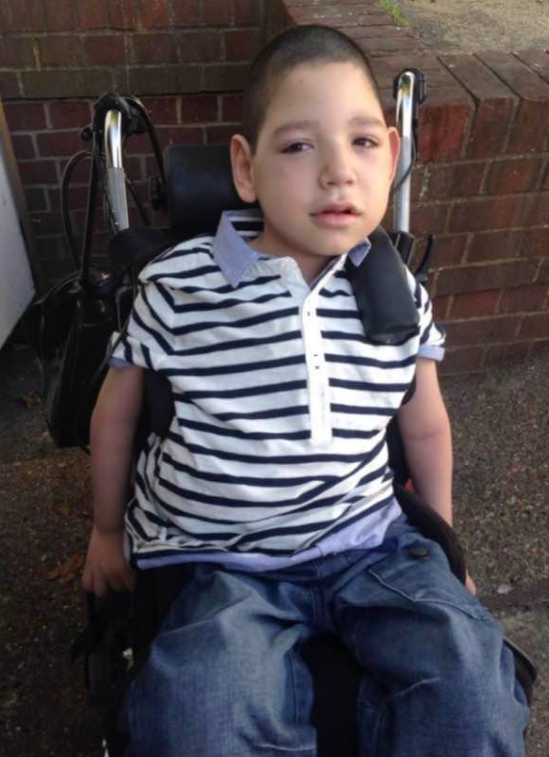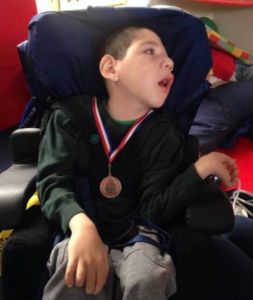A devoted and desperate mother from Hove has been spared prison after she was convicted of poisoning her profoundly disabled 10-year-old son before he died.
Pembe Mehmetaliogullari, 48, of Lower Market Street, Hove, was initially charged with attempted murder after Mustafa Mehmetaliogullari died at the Royal Alexandra Children’s Hospital, in Brighton, on Sunday 30 September 2018.
In May, a jury cleared her of trying to kill Mustafa, known as Musti, at the end of a two-week trial at Brighton Crown Court.
But she was convicted of administering a noxious substance – citalopram anti-depressant – and at Lewes Crown Court on Thursday (28 July) she was sentenced to two years in prison, suspended for 18 months.
Teresa Hay, prosecuting, told Lewes Crown Court on Thursday that the drug had not contributed to Musti’s death.
Miss Hay said: “Pembe Mehmetaliogullari was convicted of a single charge of administering a noxious substance with intent.”
She crushed and disguised the drug before giving it to her son, Miss Hay said, although this came to light only after he died.
Lewis Power, defending, said that it was an “exceptionally moving, sad and tragic” case adding: “One couldn’t have a more tragic case before the courts.
“This undoubtedly is a lady who truly loved her son. She dedicated herself selflessly for 10 years to Musti’s constant care despite rejection from her friends and family. She did it for a decade and she did it well.”
He said that Mehmetaliogullari suffered from depression, had a good character before her conviction, presented no risk of further offending and needed help not punishment.
Mr Power said: “There is no punishment that can be imposed today that is greater than the suffering that she has already put herself through.”
Mehmetaliogullari was sentenced by High Court judge Dame Justine Thornton, known as Mrs Justice Thornton, who presided over the trial in Brighton.
She told Mehmetaliogullari: “You have been convicted by a jury of one count of administering a poison or noxious substance with intent, contrary to section 24 of the Offences Against the Person Act 1861.
“Between (Saturday) 1 September and (Friday) 28 September 2018 you administered citralopram to Mustafa Mehmetaliogullari.

Pembe Mehmetaliogullari
“Mustafa, known to everyone as Musti, was your son, adopted as a baby by you and your then husband after he was found abandoned in a dustbin in a park in Turkey. At the time you were living in Northern Cyprus.
“All was well for the first six months of Musti’s life until he had a serious seizure when he was six months old.
“He subsequently developed a number of longstanding, severe and life-threatening chronic health problems including quadriplegic cerebral palsy and uncontrollable epilepsy.
“He had severe global developmental delay and was unable to feed himself. He had no speech and no mobility and he communicated by eye contact.
“He was fed by way of a tube and received medication by a similar tube.
“Despite the significant challenges presented by Musti’s medical conditions, you were determined to care for him, sacrificing your marriage to do so, when your husband said you had to choose between him or Musti.
“You brought Musti back to England to get him the care he needed. You brought up Musti largely on your own with some support from your parents, nurses and carers.

Mustafa Mehmetaliogullari known as Musti
“In 2017, you were prescribed citalopram for depression. You tried the tablets but they made you feel sleepy and you decided not to take them because you needed to be alert for Musti.
“Nonetheless you obtained several repeat prescriptions. Instead of taking the citalopram yourself, you administered them to Musti. You denied doing so but, by their verdict, the jury disbelieved you.
“Your actions only came to light when Musti was admitted to hospital with other complications from which he sadly died on (Sunday) 30 September 2018.
“Urine and blood samples taken before and after his death revealed the presence of citalopram in his body, although the citalopram was not a contributing factor to Musti’s death.
“A sample of his hair revealed the presence of citalopram all along the hair shaft, indicating prolonged and repeated exposure to citalopram over a period of weeks, if not longer.
“The amounts found in the samples were consistent with a greater than therapeutic dose for adults.
“Citalopram is normally prescribed for the treatment of depression or panic attacks. Side-effects include palpitations, tachycardia, confusion, impaired concentration, visual disturbances, amnesia and a depressant effect on breathing.
“It is not recommended for children. It was not prescribed for Musti. Administration would need to have been rectally or through his feeding tube.

Dame Justine Thornton known as Mrs Justice Thornton
“Musti was highly vulnerable. Administering the citalopram would have involved considerable planning on your part to avoid your actions being noticed by Musti’s other carers.
“The harm caused by your offending was serious. While there is no conclusive evidence of actual physical or psychiatric harm to Musti from the administration of the citalopram, that is because of the complexity of his medical conditions and the number of his medications.
“He was on at least 12 other medications including five medications for his neurological conditions.
“You have said that taking the drug made you feel sleepy and unwell yet Musti was a young child, weighing only approximately 23kg, with a compromised immune system.
“There is evidence of his unexplained drowsiness. The drugs are not recommended for children.
“The seriousness of your offending is increased by being motivated by disability, in particular, I am sure, to afford you respite from the demands of caring for Musti.
“In addition, you committed the offence in a position of trust, as his parent and carer, and in a domestic context where Musti was entitled to feel safe.

Mustafa Mehmetaliogullari known as Musti
“It is obvious from the evidence of a number of the carers helping you to look after Musti that you were a dedicated and loving mother.
“Nurses talked of the deep bond of love between you and Musti. They said it was clear that Musti was your world.
“It is also clear that caring for a severely disabled child largely on your own took its toll of you.
“Musti required care 24 hours a day, seven days a week, when he was not at school. He needed turning at night every 20 minutes in order to stop pressure sores developing.
“The burden fell largely on you. Nursing assistance was sometimes erratic and became thin on the ground from July 2018 due to difficulties in recruiting nursing staff.
“One of the nurses told the court she felt you had been let down by the caring system.
“The nurses that saw you described you as tired, exhausted and stressed. Even when you had care you were unable to properly switch off.

Lewes Crown Court
“You told the court that you had to be ready and awake and alert in case Musti had a seizure even while you had nursing care to give you a break.
“Your barrister described you as a sad, lonely and broken figure, ostracised by your friends and family for the tragic events that have led to you being before this court.
“You are 48 years old and have no previous convictions. There is considerable personal mitigation available to you which outweighs the aggravating features and … there are no reasons to indicate it would be inappropriate to suspend your sentence.
“The offence for which you have been convicted is one which will make you subject to barring from working with children or other vulnerable groups.”
After the trial judge had sentenced Mehmetaliogullari, Detective Sergeant Barry Chandler, from Sussex Police, said: “This is a tragic case and our thoughts remain with Mustafa’s family and friends at this difficult time.
“I’d like to thank the members of the jury who carefully considered the evidence put before them and I’d also like to thank the witnesses and our investigative team who worked so hard on this complex and distressing case.”
Source link



